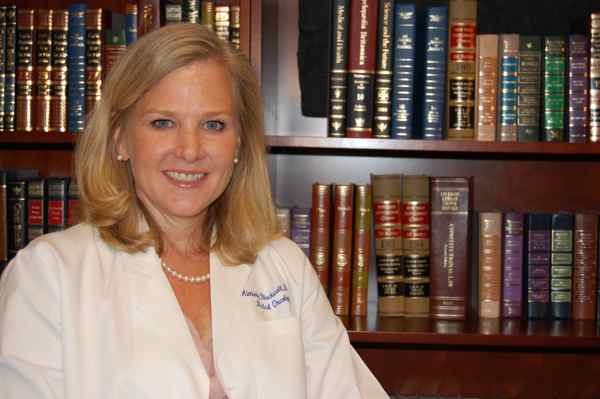
Dr. Kimberly Blackwell at the Duke Cancer Institute (DCI) treats patients, teaches medical students, and regularly runs for her own health. But her most important roles also include dedicated researcher and director of the Duke Cancer Institute’s breast cancer program.
She has led many clinical trials in search of new, more effective, less toxic treatments for breast cancer. Just last month, she received national attention for her work on the development of a new treatment for HER-2 breast cancer, which represents 20% of all invasive breast cancers. The treatment – called the first smart bomb for breast cancer – links standard chemotherapy with a second agent that hones in on breast cancer cells to do a more effective job of killing those cells while sparing healthy cells. The therapy extended survival time and significantly reduced side effects like nausea and hair loss.
“We’ve envisioned a world where cancer treatment would kill the cancer and not hurt the patient,” Blackwell, a medical oncologist, told The New York Times when the news about the study’s results was presented. “This therapy does that.”
This particular trial has ended, and the therapy, T-DM1, has not yet received approval by the Food and Drug Administration, so it is not yet available for patients. However, other clinical trials evaluating potential new therapies and new patient care approaches and resources for various forms of breast cancer are available to patients at the Duke Cancer Institute.
“We want our patients to have access to any resources they need – that includes not only clinical trials, but the most advanced mammography and imaging of all kinds, medical and surgical care, supportive care for patients and their families, advanced plastic surgery techniques, and expertise in disease progression and recurrence,” Blackwell says. “The Duke Cancer Institute provides it all.”
At the Duke Cancer Institute, a team of specialists, including medical oncologists, surgical oncologists, and radiation oncologists, as well as nutritionists, counselors, and reconstructive surgeons, expertly cares for each particular case of breast cancer. The breast cancer program’s multidisciplinary team provides expertise and services for all men and women. The program has specially designed care strategies for younger women who may have fertility issues and other special needs, and for women with inflammatory breast cancer (a rare but aggressive form of cancer). Dr. Neil Spector of the DCI is a nationally recognized expert in IBC. In addition, the DCI provides counseling in its Hereditary Cancer Clinic for families with a history of breast cancer, a program that medical oncologist Kelly Marcom leads.
The Duke Cancer Institute is especially equipped to treat women with advanced stage breast cancer or a recurrence. “Our team of experts treats only patients with breast cancer, so we understand the needs of all populations of patients and work to create individual treatment plans for each patient,” explains Blackwell.
A Breast Cancer Survivorship Clinic, led by medical oncologist Jeff Peppercorn, is devoted to the care of the thousands of women who are living with a history of breast cancer and addresses their special needs.
And Shelly Hwang, Lisa Tolnitch, Gayle DiLalla, and Nancy Crowley form a powerhouse of female surgeons at the DCI dedicated to treating women with breast cancer. Two more dedicated breast surgeons will join the team this summer.
“We have an outstanding team of specialists at our facilities in both Durham and Raleigh,” explains Blackwell. “Working together, our goal is to provide the most patient-centered, advanced, and compassionate care to every patient that walks through our doors.”
For more information about the Duke Cancer Institute, including a complete list of services and specialists in the breast cancer program, visit dukecancerinstitute.org.
A full list of clinical trials available at the Duke Cancer Institute can be found at dukecancerinstitute.org. Click on the “patient care” section, and then the link to clinical trials.
# # #





